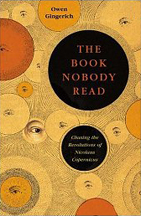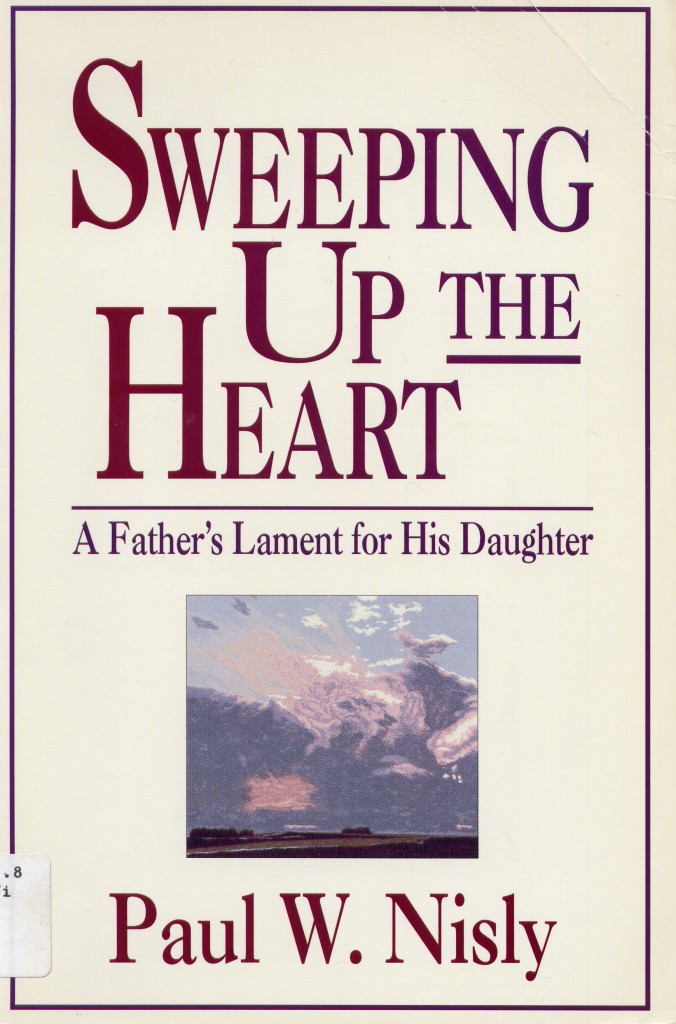2012 Lenten Reflection Series

Last week I began the 2012 series with Entering Lent: “I Want” in Higher Education. As you may remember, Kent Annan’s After Shock saturated my 2011 Lenten reflection. With Kent’s recent visit to South Central PA and the deep chord which “I Want” struck not only with me, but also a number of the students with whom I watched it, I wondered if my 2012 reflections would largely draw from his earlier book Following Jesus Through the Eye of the Needle (InterVarsity Press, 2009). Although this may still occur, on Friday I began reading a new book.
I picked up a copy of The Book Nobody Read: A Closer Look at the Book that Moved the World by Owen Gingerich, Professor Emeritus of Astronomy and of the History of Science at Harvard University and a senior astronomer emeritus at the Smithsonian Astrophysical Observatory, at Hearts & Minds Books when dropping off materials from Scot McKnight’s Christian Scholar Series presentation en route to have dinner with and then hear Owen present on the fascinating adventures related in The Book Nobody Read. But that’s not the book I’m referring to 😉
As occurs in gatherings of Christian scholars and students, I connected with a number of people.* At the conclusion of the lecture sponsored by the Central Pennsylvania Forum for Religion and Science and Messiah College’s Center for Public Humanities, my friend Ted Davis (who directs the Forum and is Professor of the History of Science at Messiah College) introduced me to Paul Nisly. Paul is a retired Professor of English at Messiah College with a specialty is Southern literature. He particularly appreciates digging into William Faulkner and Flannery O’Connor. In addition to being an academic, Paul serves as a bishop in the Mennonite Church.

When introducing my work with the Emerging Scholars Network in South Central PA and the Christian Medical Society (CMS)/CMDA at the Penn State College of Medicine, I related the various speakers which we have hosted over the past twelve months. Messiah College alumnus Janel Atlas was among those whom I mentioned. As some of you may know, Janel presented at both the Medical Center and the Elizabethtown Public Library on They Were Still Born: Personal Stories about Stillbirth (Rowman & Littlefield, 2010). Paul responded to Janel’s story and the work at PSU-Hershey by sharing some of his own loss.
In 1987, his daughter Janelle died when her car was struck by a truck which had crossed the median. Four months before she had graduated with a 4.0 from Messiah College. The accident occurred when she was returning from caring for the sick at Harrisburg Hospital, where she had begun her practice of nursing. I brought home a copy of Paul’s Sweeping Up the Heart: A Father’s Lament for His Daughter (Good Books, 1992).
With March 3 marking the birth date of my daughter Elise Faith (who was born at 23 weeks and lived eight days), I opened the cover with some apprehension. Not surprisingly, as with After Shock last year, I find the short piece both hard to read and hard to put down. I’ll read the book through several times by the end of Lent. Why? Paul’s application of literature and Scripture to the daily life issues and concerns raised by the loss of Janelle are both raw and rich giving testimony to reality of the brokenness of the creation, even at a small Christian college and part of Mennonite community in quiet South Central Pennsylvania . . . stirring a passionate longing for the true new heavens and new earth given glimpse in the resurrection/ascension of Jesus the Christ. In his introduction, Paul writes:
As I told our church congregation, if God had told me, “Paul, I’m going to let you choose the daughter you want,” I could not have chosen better. She was all I could ever have desired in a daughter. Not perfect, of course — rather too much the perfectionist with herself and others — but a daughter so caring, so loyal, so altogether exceptional, that I count myself truly blessed. . . .
A narrator in Faulkner’s Absalom, Absalom! expresses the dilemma: “There are some things for which three words are three too many, and three thousand words that many too less, and this is one of them.” My temptation was to sink into silence, acknowledging my inarticulateness as the only reasonable response to the face of great mystery (3).
Two more quotes for this week . . .
I believe in the sun even when it does not shine; I believe in love even when it is not shown; I believe in God even when he does not speak. — Verse by Holocaust victim printed on the Church bulletin the Sunday after Janelle’s death. Quoted by Paul Nisly on p.68.
I know that you can do all thing; no plan of yours can be thwarted . . . but now my eyes have seen you. Therefore I despise myself and repent in dust and ashes — Job 42:2, 4 – 5. Quoted by Paul Nisly on p.69.
2012 Lenten Reflection Series
- Entering Lent: “I Want” in Higher Education (2/23/2012)
- Lent brings me back to reflections on loss, grief, suffering (3/1/2012)
- Why does God suffer? (3/8/2012)
- Was Jesus Forsaken? (3/15/2012)
PS. Posts coming on Owen Gingerich’s dinner conversation (particularly when I asked him for advise for Emerging Scholars) and his detective-like research of Copernicus’ De revolutionibus which landed him in the courtroom; Scot McKnight’s presentations on The King Jesus Gospel: The Original Good News Revisited, Why do people understand the Bible so differently & what should we do about it? and Facing the Challenge of Universalism in the church and the academy.
*Some day I’ll have to interview James Downey about his journey from Physics Department Chair at Grove City College (where I met him as a student) to Vice-President at Pittsburgh Theological Seminary! In between he 1) taught at the Army War College, 2) served as Dean of Undergraduate Studies then Excecutive Director, Office of Institutional Effectiveness, at Regent University.
Update: 3/1/2012, 3:24 PM.
Tom enjoys daily conversations regarding living out the Biblical Story with his wife Theresa and their four girls, around the block, at Elizabethtown Brethren in Christ Church (where he teaches adult electives and co-leads a small group), among healthcare professionals as the Northeast Regional Director for the Christian Medical & Dental Associations (CMDA), and in higher ed as a volunteer with the Emerging Scholars Network (ESN). For a number of years, the Christian Medical Society / CMDA at Penn State College of Medicine was the hub of his ministry with CMDA. Note: Tom served with InterVarsity Christian Fellowship / USA for 20+ years, including 6+ years as the Associate Director of ESN. He has written for the ESN blog from its launch in August 2008. He has studied Biology (B.S.), Higher Education (M.A.), Spiritual Direction (Certificate), Spiritual Formation (M.A.R.), Ministry to Emerging Generations (D.Min.). To God be the glory!

I Don’t Really Understand What All Of This Was About, But OK! This Is OK I Guess, Even Though I Did Not Really Understand What All Of This Was Saying! 🙂